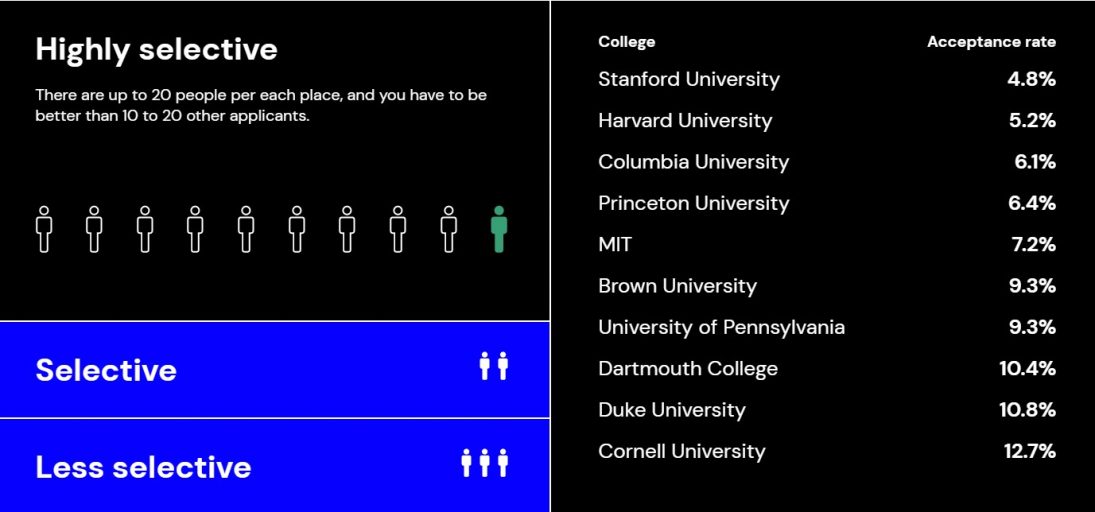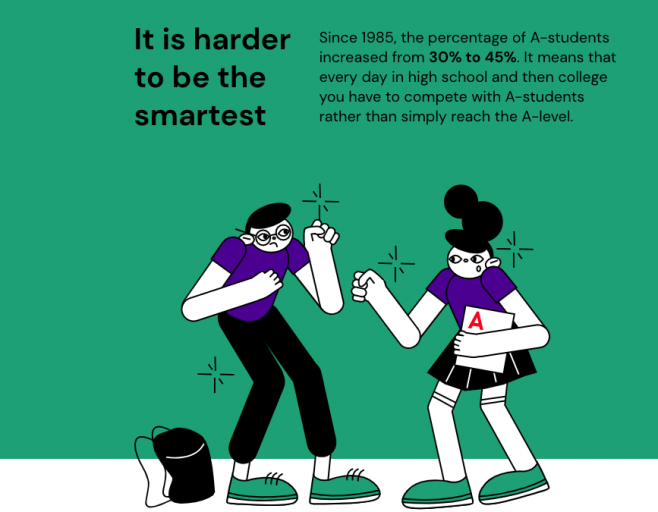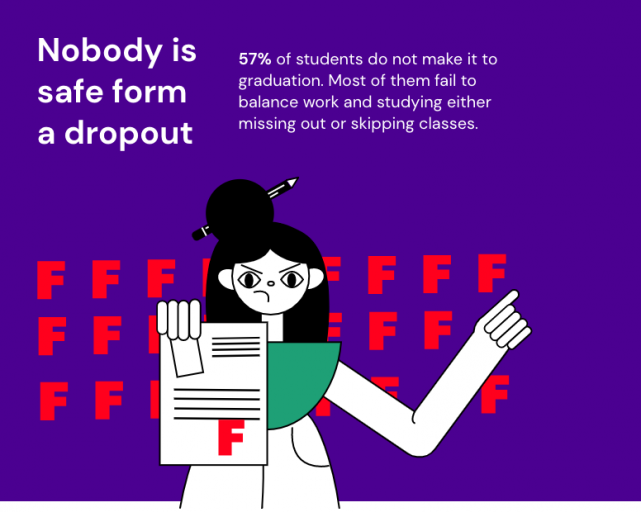Today, obtaining a degree and a profession are two of young people’s greatest aspirations. Kids begin to think about the college they plan to study at long before graduating from high school. Due to the availability of background education, there are more applicants for each place in college, as well as a multitude of exceedingly qualified students in terms of grades and ratings. Finally, there are even more challenging factors students face nowadays, such as homesickness, stress, and time management. Here are a few tips about how you can cope with these complications and enter the college of your dream.
Acceptance into colleges
There are colleges and institutions of different ranges that students aspire to graduate from. Colleges may be classified according to their selectiveness in the acceptance process, which is enhanced by the status value of the institutions. Thus, most of the colleges may be divided into three categories: highly selective, selective, and less selective. We’ve chosen a few most popular institutions for this article, but you can read the full research here if you’d like to find out more about the acceptance criteria of various institutions.
Highly selective
These are the hardest-to-enter institutions. Usually, they admit one applicant out of 10 to 20. Their acceptance rates vary from 4.8% to 12.7%, so the earlier you make up your mind to enter one of these, the higher your chances are of getting in. It goes without saying that such colleges give solid opportunities in business and academic careers. Highly selective colleges include Brown University, Columbia University, Cornell University, Dartmouth College, Harvard, MIT, Princeton, Stanford, and many more.
Selective
These are the colleges that have a higher acceptance rate, yet still challenge the applicants during the admission process. These colleges have to reject from 60 to 80% of the applicants, or in other words, each applicant competes with 2 to 4 people for a place. The chances in these are more optimistic than with those in the previous category, but still they take some sweat to enter. These colleges include Bates College, Boston University, Carleton College, Emory University, Grinnell College, and so on.
Less selective
This category of colleges and universities is the easiest-to-enter. However, it does not mean their acceptance will be effortless. Commonly, these colleges have remarkably high acceptance rates which can reach up to 84%. Nonetheless, these colleges have standards that every applicant has to live up to, as applying to one of them does not guarantee total success. Colleges such as Portland State University, Hope College, University of Alabama, University of Utah, and Furman University are all good examples.

Image credit: CustomWritings.com
How to increase my chances of acceptance?
If you decide to enter any of these colleges, you need to make sure your grades and GPA fit the acceptance criteria. Also, you need to present yourself as a well-rounded and inspired personality. Practically, it means participating in extracurricular activities and non-profit organizations and clubs. Such background will boost your acceptance chances, especially if the extracurricular activities are related to the major you are applying for. Finally, you need to present all of these elements in an interesting way in your college application.
Average grades and competition
The competition for higher education neither starts nor ends at the admission stage. The more prestigious the institution is, the earlier you enter this competition and the later you exit it (ideally at your graduation).
GPA and college acceptance in colleges
Historically, now is the most convenient time for young people to study in terms of opportunities and available means to take part in it. As we mentioned before, informational and learning resources are easy to access. It means that it is generally easier to learn, which means an overall improvement in grades among students. Consequently, the average number of A-students has increased, along with the requirements for students in universities, competition, and dropout rates.
Since 1985, the percentage of A-students has increased from 30% to 45%, and this tendency is steady and ongoing. Thus, there appears to be a competition among those who study excellently. This is an aspect that will impact your acceptance into the college you want, even if you have high grades.

Image credit: CustomWritings.com
Dropout risks
Even if you are already studying at the college you wanted, the competition does not lessen. As of 2017, 57% of students do not make it to the end of their program. Here are the things standing in your way to a successful and smooth graduation.
Time management issues
For ill-prepared people, joining campus life may be a challenge, as you have to maintain your rating and your physical health, the latter having a strong tendency to being compromised. Keeping up with all the disciplines and classes gets even more complicated if a student has to earn money. The top reason (54%) for dropout is the inability of students to balance work and studying. It means that many students have to compromise their academic performance in favor of earning money.
Commonly, students who combine college and work have to prioritize the disciplines that they take, neglecting the complementary disciplines that are not directly related to their major. As a result, it either influences their overall rating or causes them to realize they are far behind in the syllabus.
In a perfect world, you should be a good student in every discipline. Even if you think that a subject is secondary or not that important for your future profession, you need to keep the grades high. Moreover, you need to make sure you ace the disciplines that are directly related to your major. You need to understand everything clearly and profoundly.
Stress in college
The high competitiveness in colleges puts a lot of pressure on students. The cumulative strain of additional activities and/or the goal of being number one can lead a person to a really dark place. Longitudinal stress during the studying process proved to be a reason for voluntary dropouts among students. Usually, the reason is not the stress itself but its duration and the emotional pressure it makes for a student. Continuous pressure on one’s nervous system combined with an unhealthy sleep pattern causes distress that may develop into clinical or subclinical depression. Eventually, such emotional conditions can cause a person to drop out from college, voluntarily or because of negative changes in grades.
Homesickness
Homesickness is a topical issue for international students or those who have to move away from home within their own country. It works like (and has a similar effect as) stress, but homesick students are even more prone to dropping out, as homesickness itself is an emotional state that makes a person especially vulnerable to other stress factors.

Image credit: CustomWritings.com
What can be done?
Stay focused
Not all your subjects appear interesting and important enough, so you feel the need to compromise them and concentrate directly on those directly related to your vocation. Nonetheless, all of the classes are included in your rating, and so you need to keep up with all of them. If you decide to prioritize, you may miss out on other subjects, which will be difficult to catch up on.
Do not neglect your emotional stability
Pay attention to your physical and emotional needs. Try to make your own agenda and make time for healthy sleep and emotional relief. Although stress sometimes helps us to do more and do it better, its constant presence will damage your psyche, leading to nothing good education-wise. Plan all your homework in advance to have less stress and fewer sleepless nights, which will ensure (or at least will not reduce) your willingness to study and optimistic spirit.
Get help if you need it
If you want to keep up with all the subjects, but cannot pay for it with your emotional or financial stability, you can use professional help with writing essays. A custom service will help you with any type of a writing assignment when there are a few too many of them. You can control all the details of the assignment and the deadline within which you need it.
***
Studying is hard, but it is also not impossible. With a systemized and optimistic approach, even a variety of obstacles can’t prevent you from obtaining the degree of your dreams.




